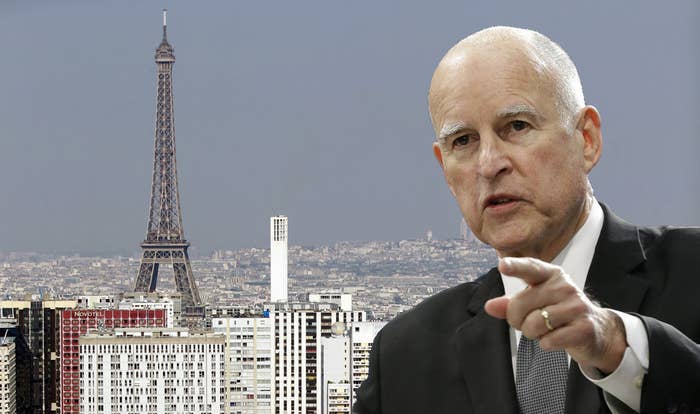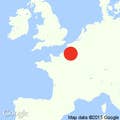
PARIS — At the Paris climate talks this week, California was the star on the world's green carpet, despite not actually having a seat at the negotiating table.
Seemingly at every turn there was a news story about California, or a crowd of people taking pictures of a California official, or Gov. Jerry Brown chillaxin' with someone important. California is not a country, of course, but for a little while there it kind of felt like one. In the amount of attention it received, the influence it seemed to have, and, yes, the level of celebrity it commanded, California soared above most of the actual countries at the global climate talks.
One of the biggest reasons for the state's outsize influence at the talks was that it came with a bag full of ideas that are as sunny as the state itself. During a conversation Thursday with BuzzFeed News in the Paris suburb where the talks are taking place, Kevin de León, California Senate President Pro Tempore, outlined one of the most powerful of those ideas: economic growth and climate action that go hand in hand.
"We have successfully decoupled carbon from GDP," he said.
De León was referring to a system built on California's cap and trade program — surely the largest feather in the state's large climate cap. The details of the program are complex, but basically the program limits, or "caps," the amount of pollution big industries can emit, but also lets them pay to go over those limits. And combined with California's thriving economy, it offers the promise that fighting climate change doesn't have to mean sacrificing prosperity.
The program was a hot topic at the climate talks. Brown's busy schedule gave him plenty of opportunities to speak about cap and trade, and his evangelizing is what earned California much of its attention and influence. For example, at one gathering in the conference's "blue zone," an area open exclusively to people with credentials, Brown's audience swelled to standing room only.
On another afternoon, also in the blue zone, this reporter ducked into a random press room only to discover several Canadian officials talking excitedly about linking their own cap and trade programs to California. The moment emphasized the very real international coalition building California has been doing in recent years — something that was on display this week and which made it feel as much like a nation as a state.
It also didn't hurt that California's last governor, Arnold Schwarzenegger, spent several days at the conference, surrounded by media and touting many of the same ideas as Brown. In many ways, in fact, Schwarzenegger was the perfect embodiment of the state at the conference: flashy, in demand, super buff, and right in the middle of the Venn diagram of politics and celebrity. It's tough for anyone, and especially smaller nations, to match Schwarzenegger's star power, and in many ways he seemed to be there first and foremost as a Californian.
But California's appeal went beyond just cap and trade and celebrity. De León, who spoke to BuzzFeed News in a sleek lounge area after his final panel discussion in Paris, pointed to the fact that the state is working on using cap and trade to alleviate inequality.
"We must democratize our climate change policies," he said. "It's critically important that we make sure we include everyone in our climate change policy."
De León pointed to a California law that sets aside 25% of the money generated by the state's cap and trade program for use in disadvantaged and low income communities. The money is used for things like solar panels and vouchers for electric cars, he said, because "it's not just the rich who should have access" to green technology.
California had a whole slew of other accomplishments to tout in Paris. The state has invested heavily in renewable energy; it recently passed a law to increase household energy efficiency; the state leads the U.S. in the percent of electric vehicles on the road.
"When folks learn that we're from California, eyes do open and people are willing to listen," de León added.
All of this played into California's star power at the climate talks. Besides the small press corp that followed Brown around Paris — which alone was more than some national representatives had — California scored headlines on how it was marching "into Paris to fight the climate apocalypse," and how nations were "looking to California."
Others noted that California had "a message for the world" and wondered if the state could help the talks themselves succeed.
Back at home, though, the state's climate record is more complicated. Brown is currently embroiled in a controversy over firing oil regulators, and many local environmentalists had harsh words for him leading up to the talks. At one of his Paris appearances, he also faced a small protest over his fracking record.
De León also acknowledged that the state has serious problems with income inequality, though described the state as on one of "contrasts" and pointed back to the cap and trade program that aims to fix some of those problems.
Still, those issues didn't seem to weigh the state down in Paris.
Ricardo Lara, a California state senator from Long Beach, also traveled to the talks and spoke with BuzzFeed News Thursday. Lara said he participated in a presentation with Brown to the U.N., touching on the state's climate goals. The Californians were the first people in the meeting who presented. When they were done, another group got up. It was the United States.
"California has led with intentionality," Lara concluded. "People are really looking to California and the leadership that we've demonstrated in these policies."

